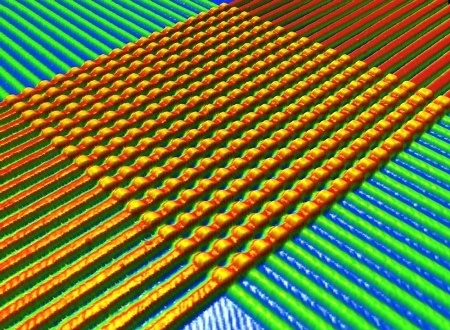After years of extensive research activities, researchers and technologists are exploring the ways for measuring and controlling matter in order to develop basically different electronic devices. Three experts have analyzed the dynamics that make this achievable in a special discussion.
 A memristor, the first fundamentally new electronic circuit device in more than 100 years. Although memory resistance is fundamental to all matter, such devices are not practical except when fabricated on the nanoscale. (Courtesy: S. Williams)
A memristor, the first fundamentally new electronic circuit device in more than 100 years. Although memory resistance is fundamental to all matter, such devices are not practical except when fabricated on the nanoscale. (Courtesy: S. Williams)
The researchers included Michelle Simmons Scientia Professor and Director of the Australian Centre of Excellence for Quantum Computation and Communication Technology at University of New South Wales; Stan Williams, Hewlett-Packard Senior Fellow and Director of Hewlett-Packard’s Cognitive Systems Laboratory; and Paul Weiss, Director of the California NanoSystems Institute and Fred Kavli Chair in Nanosystems Sciences at UCLA.
One of the topics discussed was 4-atom-wide nanowires developed at Simmons’ lab. The discussion also included the demonstration of a working single atom-made transistor. According to Simmons, it is the right time to give special attention to quantum computing as significant achievements have been made in this field.
The researchers also explored the challenge of introducing transformational developments to the industry. During his discussion on Hewlett-Packard’s commercialization plan of a memristor-based mass-market flash memory device, Williams informed that development costs were at least 10 folds higher than that of research, and commercialization costs were 10 folds higher than that of development. This meant that costs associated with research, which was considered as the significant stage, were mere 1% of the overall effort. A memristor is a new class of electronic device in which information is stored by controlling the position of a few atoms.
Weiss stated that the dynamics can be improved in many ways for development. However, researchers must seek ways to integrate the discovered phenomena and materials into broader structures in order to fabricate everything reliably and to develop robust systems.
Source: http://www.kavlifoundation.org